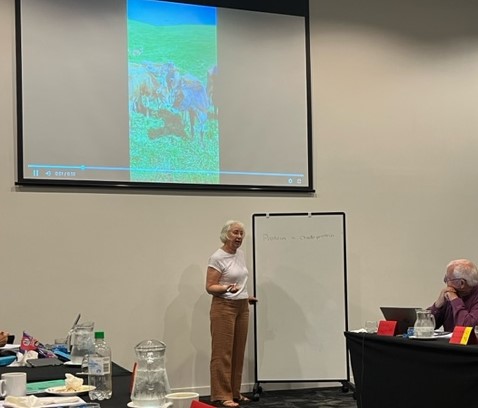And here we are at the start of April 2023 – They say time flies when you’re having fun!
So far 2023 has given many a roller coaster ride, a crazy year with extreme weather anomalies, many of which I don’t think would be considered fun. It has been heartening to see the charity and compassion that many have offered total strangers in their hours of need. Not to mention the strength of character shown by those whose world was changed overnight and their ability to get on with the task at hand. We hope that those in our wider NZ Grazing family, who have seen some very challenging times of late, are on the road to recovery.
We here at NZ Grazing have recently gathered to attend one of our professional development staff conferences in New Plymouth. At these conferences we discuss issues and ways to improve our systems and services to our clients. With our team being based all over the North Island, we share our learnings. We also bring in some outside NZG experience to extend our knowledge.
This time around we heard from Dr Sue Macky who is a very experienced dairy cow nutritionist. Sue has a practical approach to growing great dairy heifers. Sue talked about two key areas impacting
heifer growth which will be beneficial whether you are a dairy farmer or a grazier:
1. heifer behaviour, and
2. the role of fibre for a healthy heifer rumen.
Heifer behaviour does impact how a heifer grows. You can change her behaviour to increase the time she spends grazing. Heifers don’t like being parked in a paddock. They are less interested in eating grass they have already walked across and are unmotivated to graze more than what they need for maintenance. Giving them a fresh break daily stimulates grazing behaviour. No Bull! But talking of bulls, our best-ever bull beef grower bettered Sue’s recommendation and gave their bulls two fresh breaks a day and consistently were our top bull grower from hundreds of grower farmers. While this may not be on your grazing management radar you can do other tricks to stimulate heifers to graze, no one’s saying heifers are super smart!
- Fence off a corner of a paddock to give them the next day, they will graze that new area and then re-graze the previous area with more vigour.
- If they haven’t done justice to a paddock you have had them in, shift them somewhere else for a day or two and then re-introduce them to the previous paddock. Their grazing behaviour will be more vigorous than if you had left them in that paddock for more days.
If there’s been a season to emphasise the value of fibre in a dairy heifers diet it has been this one! With the high levels of rainfall this summer and the resulting soft squelchy “gutless” grass, the addition of fibre is the secret weapon to good heifer growth rates. The addition of silage, hay or straw, even in very small quantities, can change the functionality of the rumen and the growth output from the gutless grass. Have you ever noticed heifers wandering aimlessly as you have just put them in your beautiful paddock of grass? They are missing fibre to accompany that lush grass. This can be very prevalent in heifers post-trucking. Sue’s advice post trucking – give them water and silage, hay or straw for a few hours after they arrive on farm then put them out in the paddock. Their rumens will be ready to digest green grass then. Fibre also plays a very important role in pre- trucking heifers. The rumen produces considerable amounts of acid to break down the consumed feed. It has not been designed to be empty for long periods as they are when trucking. Pre trucking give them water and silage, hay or straw to reduce the effects of acid on an empty rumen and ensure they arrive at the next farm without a guts ache. The heifers will recover from trucking much quicker and get back to good growth rates.
Looking forward, we are planning and preparing for our busiest time of year, returning the in-calf R2 heifers home to the dairy farms and picking up the May to May lines to go out to our grower's farms in late April and early May. All in all, it will be many thousands of heifers being weighed, trucking with reports and invoices being processed all in a space of about three weeks. Our team will be working to some tight timeframes so please help us to stay on schedule eg have spare EID tags on hand, backup staff in case covid comes to visit you, and confirm trucking has happened to your service manager asap. In advance, thanks for your cooperation at this busy time and here’s hoping for some settled weather!
Bridget Clark
Operations Manager
NZ Grazing Company

